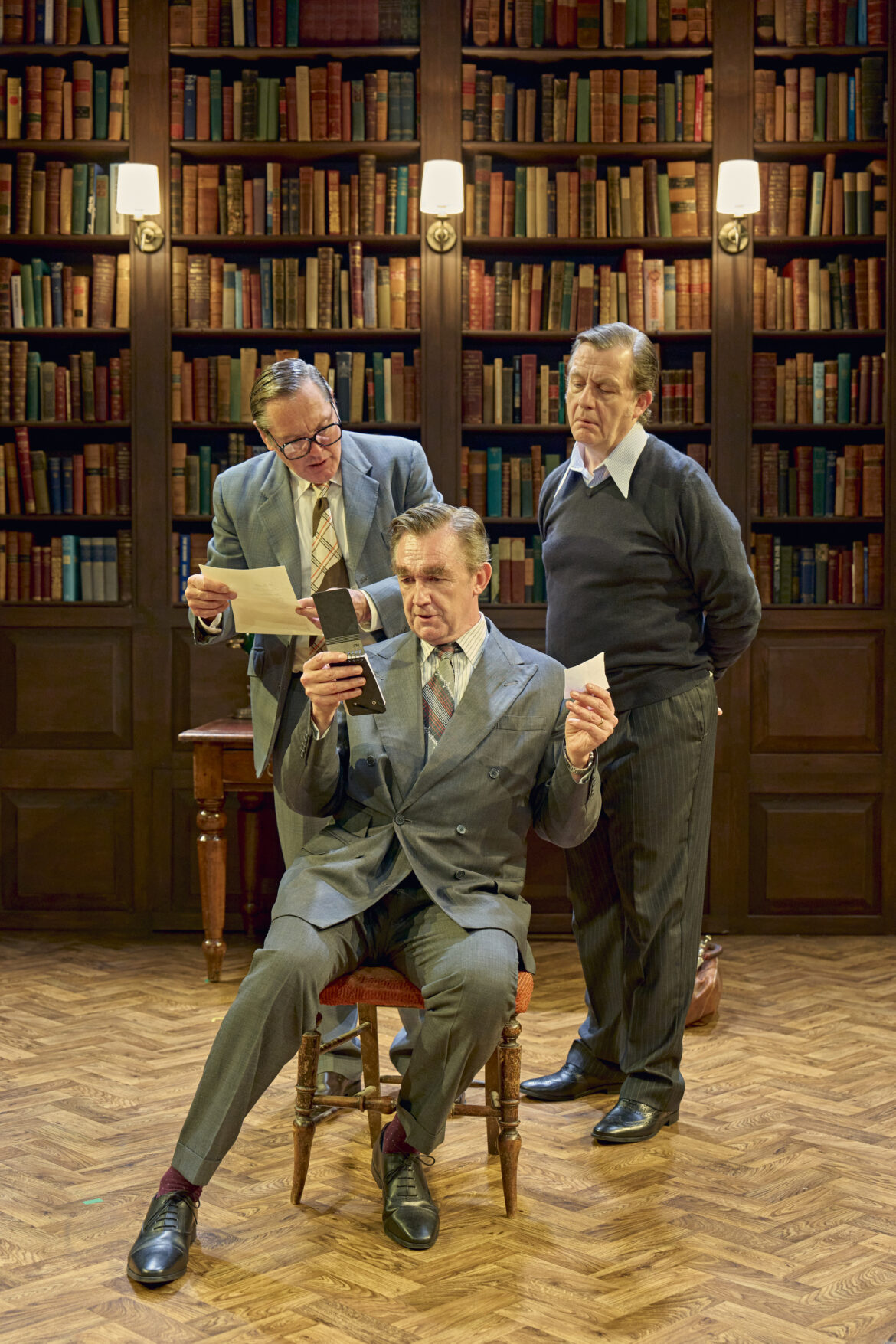Review by Simon Jenner, May 6 2025
“The bespectacled godfather to the Age of Aquarius” quips an old Oxford friend. Roy Jenkins indeed did legalise abortion, homosexuality, suspension of the death penalty, abolition of the Lord Chancellor’s office (just as well for this play)… and has a fatal attraction: to Europe. It’s 1972 and three men meet to decide who of their moderate troika should be leader of the Labour party. Though there’s isn’t currently a vacancy. And they keep meeting whether there is or isn’t; even when there can never be. Robert Khan’s and Tom Salinsky’s The Gang of Three premieres at the King’s Head Theatre, Islington directed by Kirsty Patrick Ward till June 1st.

Alan Cox, Photo Credit: Manuel Harlan
Khan and Salinsky are celebrated for such razor-in-velvet satires as Brexit, Coalition, Kingmaker, Impossible. The quipper of such bon-mots is now the least known of this trio: Tony Crosland (Alan Cox) was the original Nearly Man, and indeed you feel that almost-forgotten classic TV series of 1975 might have been written for him. But he was generally regarded as the most intelligent, and his The Future of Socialism from 1956 a bible (which Tony duly plucks out of his friend’s bookshelf in the first scene).
Though as his old friend Roy Jenkins (Hywel Morgan) points out, 16 years ago, or later 20 years back, and Tony hasn’t come up with anything new. There’ll never be a party of Tony he quips. Quite apart from never placing Roy in the acknowledgments, and penning instead a “salty” personal dedication. Only later we might guess Roy would never dare show it to anyone else.
Tony though has been asking Roy for support as Deputy Leader. Roy equivocates. Morgan’s superb at hauteur: born of an uneasy mixture of hard-won privilege (his father too was an MP, and Sorbonne-educated), but he still flinches at his Welsh mining heritage. Cox, faun-like in his camp poignards of wit, his aerial almost acrobatic slides and comfortable slouches, dresses down because he can. Morgan’s Roy dresses up for a perpetual Savoy.

Alan Cox, Colin Tierney,Hywel Bennett. Photo Credit: Manuel Harlan
This is a play stuffed with wit, each arising from its context, full of knowing winks to the audience. And a few anachronisms: a follower of Foot apostrophised as “with that gangly beard… Gerald..? Corbyn.” Corbyn wasn’t elected till 1983 and was then seen as a moderate! No matter, it’s funny and such jokes about Europe and such reminders of Labour’s Euroscepticism and discussions of US and other tariffs point up the relevance of Britain’s plight, then as now: dependant on the US, standing obliquely to Europe.
And there’s the “danger” of the Left taking over, which might have been a thing for “moderates” in 2017, but rings a little retro now. Their delight in banishing Barbara Castle shows how they’re allied to “moderates” of a later age, but paradoxically, none would have found a home in today’s Labour party, where only an AI version of assent is tolerated.
Above all it does underscore how these three were titans in an age of giants, and how we’re currently ruled by miniature robots. Wilson for instance reversed an unpopular pensions policy in 1965 and won a landslide. This trio, and the wider party relished dispute. In 90 minutes ending on a sudden turn this is an absorbing, outstanding political drama
Libby Watson’s set delights in a grand bookcase and a few moveable sofas and desks; and delights in sartorial costumes. It’s lit by Jamie Platt with spectral effects as we freeze for an out-of-time monologue (a true Machiavellian aside), bluish with dark-pink shadows falling over the bookcase. It’s an exquisitely realised set all round, with Dominic Brennan’s sound design and movement by Ira Mandela Siobhan.
Each character rides blows of fortune that deny them the top job, and accommodate, recalibrate, and in one case do the unthinkable. In another the unthinkable is done to them. It was Private Eye who immortalised Jenkins’ exit for the SDP: ”I leave the Labour party without wegwet and without wankour.” Morgan evokes this lisp earlier in 1940, but faintly, and accurately underplays the orotund Woyisms. Tierney playfully makes Healey sound a little Churchillian, reaching for his bass notes and Healey’s inimitable burr.
Cox enjoys the brightest freedom from any expected tone, and delights in knowing homoerotic playfulness as Tony teases the younger Roy with knowledge; and afterwards. There’s a mercurial, gadfly brilliance in his Tony Crosland, and a corresponding fleetness as his electron darts round the proton and neutron (you can decide which) of his weightier colleagues. Healey’s real-life humour and dark dismissals were always weighty (as this writer remembers in a bookshop encounter over Josephus). Even in his 90s, Healey twitted a young Japanologist friend: whether she knew what a Japanese word meant. She didn’t. He then delighted in revealing the obscenity.
The wittiest, wisest play I’ve seen this year, it deserves a long run, not least so we can absorb its lessons. Unmissable.
Casting Director Harry Gilbert, Stage Management Felix Dunning, Production management Dan Weager, Press David Burns, Marketing Cup of Ambition, General Management James Quaife, Graphic Design Laura Whitehouse, artwork Photography Steve Ullathorne, Production Photos Manuel Harlan, Production Trailer Erica Belton at Pip Films, Rehearsal Space The Union Theatre, Set Construction SAS Works, Furniture Hire national Theatre, Production Insurance Israel, Gordon & Co. Ltd.



